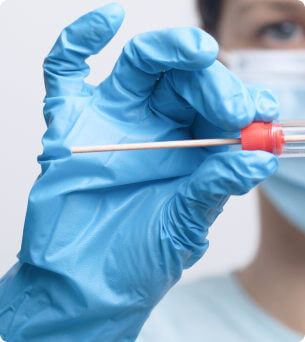Some medications work better for one person than another, and differences in the side effects people experience can also occur. Genetic factors play a crucial role in this. DNA testing can help determine the ideal dosage of medication for individual patients. Together with the Mozand laboratory, Easly is working on a pharmacogenetics self-test, which will be introduced later this year.


After a medication is taken, various processes are set in motion in the human body. The drug is absorbed into the blood (absorption) and distributed throughout the body (distribution). Similar to food, medications are also metabolized (metabolism) and eventually eliminated from the body (excretion). All these steps together are called pharmacokinetics and are crucial for the effectiveness of the medication. Enzymes play a significant role in each of these steps.
Medications in active and inactive forms
Medications can be broadly divided into two groups:
- Medications taken in their active form → these medications will work until they are broken down, or until metabolism occurs.
- Medications taken in their inactive form → these medications will only start working once they are converted into the active form, or after metabolism has occurred.
Standard dosage
takes into account the general pharmacokinetics of the specific medication. The prescribed dose must be high enough for the medication to work sufficiently and for a long enough duration. At the same time, the dose should not be too high, as this may lead to unpleasant side effects. The dose at which a medication is effective but not toxic is called the therapeutic range.
Every body is different
In practice, every body is different. The enzymes responsible for processing medications do not work at the same speed/efficiency for everyone, so the standard dose is not suitable for everyone. For example, it’s possible that a medication is taken in its inactive form, and the enzymes that convert the medication into the active form work faster than average. This creates a situation where a larger amount of the active form of the medication is present than expected, leading to more or severe side effects. The reverse can also be true. If an inactive medication is converted into its active form more slowly, the therapeutic range is not reached, and the medication does not work as desired.
Genetic factors
The most suitable dosage of a medication is partly determined by how well/efficiently the enzymes process the medication. The efficiency of these enzymes is, in turn, influenced by genetic factors (DNA), which can vary from person to person. The activity of the enzymes is categorized into four groups, ranging from the least active to the most activ
- Poor metabolizer (PM)
- Intermediate metabolizer (IM)
- Extensive metabolizer (EM) or normal metabolizer (NM)
- Ultra-rapid metabolizer (UM)
A new pharmacogenetic self-test
Easly and the Mozand laboratory are currently working diligently on the development of a pharmacogenetic self-collection test, which can provide personalized medication advice for everyone. The test can be easily conducted at home by collecting buccal (cheek) swab samples and sending the specimen to the Easly laboratory. With the information from the test results, doctors and pharmacists can then collaborate to ensure a well-adjusted personal medication dosage, following the guidelines of the Royal Dutch Society for the Advancement of Pharmacy (KNMP). The test has the potential to play a constructive role in the more effective and less side-effect-prone use of medication.
The new self-collection test is currently in the validation phase and is expected to be introduced later this year.
Sources:
Farmacotherapeutisch Kompas — Farmacokinetiek
- Farma Magazine — Het belang van farmacogenetisch testen sijpelt bij steeds meer huisartsen door







